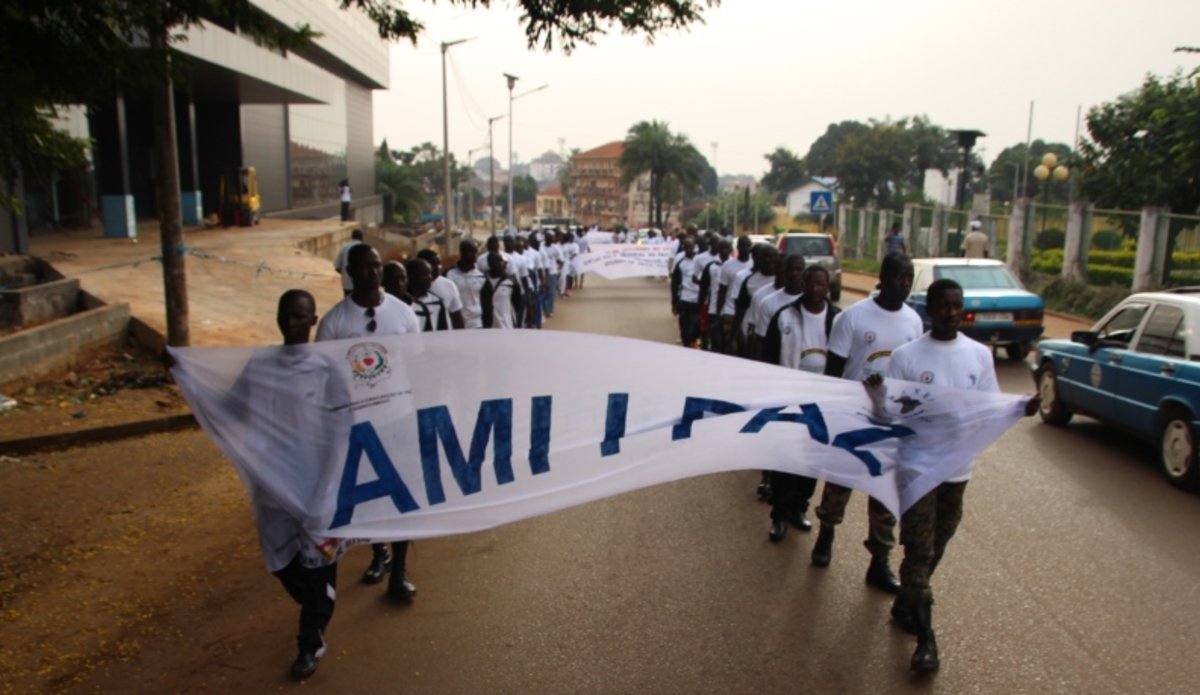Marching and brainstorming mark International Day of Peace celebration in Guinea-Bissau
A day, according to the chairman of the Commission, Father Domingos da Fonseca, very important for humanity. That is why the COCN wanted to use the symbolism of a Caravan of Peace "to reinforce the need to walk together, to build a true peace, capable of leading Guinea-Bissau to development paths and social welfare in general."
Domingos da Fonseca also said that "if this cause is just, then the ends will be reached, if Peace is the way, then we will march to that destination, because only with truth and peace will Guinea be liberated."
"The COCN will continue to work towards compliance with its road map and the timetable established for the National Conference around its noble objective, which is to start and strengthen the process of a lasting reconciliation in Guinea-Bissau," he explained.
The UN Deputy Special Representative of the UN Secretary-General in Guinea-Bissau, David MacLachlan-Karr, conveyed the message of the Secretary-General on this day reminding us that the United Nations mission "is to work for peace - every day and everywhere. We must not allow any group interest, national ambition or political difference should be allowed to put peace at risk."
A group of about 100 people from civil society, women's associations, among others, started the march at Benfica headquarters (in downtown of Bissau) intersection then crossed the “Avenida dos Combantes da Liberdade da Pátria” and finally gathered in the green space of Bairro D’Ajuda still in Bissau for cultural activities and speeches.
Also marking the date, the auditorium of the National Institute of Studies and Research (INEP) hosted a conference. This conference was sponsored by this institution, in partnership with the United Nations Integrated Peacebuilding Office in Guinea-Bissau (UNIOGBIS), on the theme "Teaching History as an Instrument for the Building and Consolidation of Peace in Guinea-Bissau." At the conference, given by Leopoldo Amado, moderated by Fodé Mané, with the comments of Carlos Pereira, a good number of young students from different universities of the capital, history teachers and scholars in this area participated.
UNIOGBIS also dedicated a one-hour live radio broadcast on Radio Sol Mansi to "The Challenges of Peacebuilding in Guinea-Bissau" on September 21, anchored by Rui Jorge Semedo, an INEP associate researcher with Father Domingos da Fonseca, President of the Organizing Committee of the National Conference (COCN) – “Paths to Peace and Development,” Júlia Alhinho, Officer and Head of the UNIOGBIS Public Information Department as guests.
In his analysis, Rui Jorge Semedo said that at the origin of the instability is the fact that the policy that Amílcar Cabral drafted for the country after its independence did not continue, and that led to Guinea-Bissau to face moments of an apparent peace for about six years, during which the young State received much international help. He recalled that during that time, "the young State had already opened several factories, including a car assembly and an agro-industrial complex."
However, on November 14, 1980, "resentments of difficult explanation led to a military coup d’état, which was the beginning of a phenomenon that, for years after, turned into a vice of bad taste. This situation of instability, added to the impossibility of the authorities of the country to escape the circle of a market to which the neighboring countries pulled it and the absence of State authority, made the Guineans have the country they have," said the researcher.
Father Domingos da Fonseca reiterated the need and the urgency of the national conference, an event considered as "a means for Guineans to define how to solve and heal the wounds that the liberation struggle, coups d'état or different rulers caused to some and others.”
The head of UNIOGBIS's Public Information Department, Júlia Alhino, reaffirmed the resolve of the United Nations and the international community as a whole to help Guinea-Bissau resolve its political crisis by focusing on the Conakry Agreement and other instruments established for this purpose.
 UN
UN





